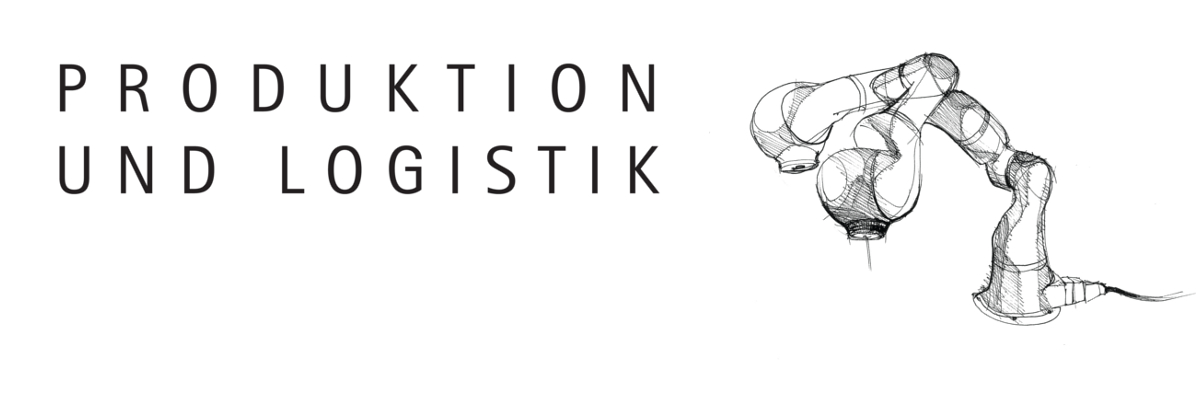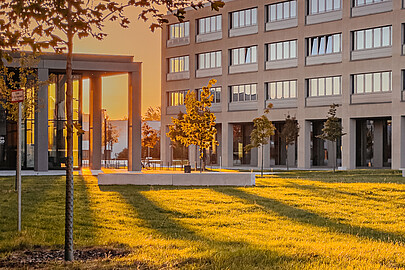As a rule, the course of study takes 6 semesters. After passing the bachelor thesis you will receive the degree Bachelor of Science.
From the winter semester 2024/25, it will no longer be possible to enrol on the Bachelor of Production and Logistics. Please note the following information on the changes to the examination regulations for students already enrolled on the Bachelor's programme.
What can you expect during your studies?
A special feature at the beginning of your studies is the practice-oriented Bachelor's project. You will work in a group on current research and practical problems of the faculty institutes. There are 13 projects to choose from, covering the two specializations "Production Engineering" and "Technical Logistics Supplychain Management". For example, you will work on the development of an additional smartphone lens, the design of an electrically powered car or the production of individual components for a racing car. In this way, you will gain practical experience in the first semester, develop targeted solutions and implement them. At the same time, you will learn skills such as teamwork, project management and personal responsibility.
In addition, the first four semesters of the program focus on technical subjects. For example, mathematics, technical mechanics and electrical engineering are on the curriculum. From the third semester onwards, you will take courses in business administration, corporate management and production engineering and can choose the corresponding specialisation modules. Laboratories and a subject-related tutorial supplement your studies. An internship can be completed optionally. In the 6th semester you will write your bachelor thesis and thus complete your studies. With the academic degree B. Sc. Production and Logistics, you will receive a professionally qualifying engineering degree, which will open up a wide range of professional activities or give you the opportunity to specialise further in a master's degree course.
Internships
Preliminary internship
For the Bachelor's degree programme Production & Logistics, a so-called pre-study internship must be completed. The eight-week pre-study internship must be completed by the end of the third semester, i.e. you can also use the semester break for your eight-week internship. However, it makes sense to complete the internship before you start your studies in order to acquire a basic understanding of study contents and to prevent time bottlenecks within your studies. The areas of activity to be covered are laid down in the internship regulations.
Internship
The twelve-week specialised internship, on the other hand, can be completed in the Bachelor's programme or in a subsequent Master's programme. Those who decide to complete the internship only in the Master's programme choose in-depth elective modules instead.
Qualification goals
-
Tasks and requirements in production and logistics ...
Production and Logistics is concerned with technical processes and methods for the production and distribution of technical goods as well as with the planning, organisation and optimisation of the processes and resource flows required for this in manufacturing companies. Special consideration is given to the mechanical engineering prerequisites and possibilities for realizing detailed characteristics of these artifacts in the course of the manufacturing process and the criteria-led (effective / efficient / changeable / economic / sustainable) design of the underlying processes and systems. In doing so, it is essential to meet the requirements of flexibility, automation and intelligent self-control.
-
The main qualification goals of the Bachelor's degree in Production and Logistics are ...
- a sound understanding of mechanical engineering fundamentals, their scientific basis and their mathematical modelling (materials science, engineering mechanics, thermodynamics, control and measurement technology, production logistics, product development and production engineering)
- a theory-based understanding of manufacturing technology (production processes, production planning and control, etc.) and the functional and design principles of production machines and their design
- a theory-based understanding of the planning of production processes (organizational form, operating resources, resource flows and logistical processes) and design of production systems; business knowledge about companies as organizations
- the understanding and application of engineering methods in the development of production-logistic solutions (planning, conception, design and evaluation)
- the application of standards of scientific work to structured questions of medium complexity
-
Graduates are able to ...
- apply and adapt engineering methods and procedures in the processing of production-logistical tasks of medium complexity
- identify requirements for manufacturing processes, select manufacturing technologies on a well-founded basis and optimize manufacturing processes
- plan, implement and control productive and logistical processes in a criteria-oriented manner
- analyse company-specific interactions and determine technical and economic requirements
- work independently on specialist projects; to design work processes in teams in a technically and communicatively goal-oriented manner
- independently develop disciplinary subject areas and to link them to application areas in an expert manner
Application and start of studies
Areas of activity
With your degree, you have the opportunity to work as an engineer in companies that specialize in production and logistics processes. You will be responsible for planning and implementing the manufacturing process of goods and for the optimal use of production facilities. You can also work in enterprise management, quality control or materials management.



Module plans and catalogues
Exam regulations
Modules from the bachelor course Production and Logistics have a different name in Stud.IP than in the course and module catalogue.
Module name according to module catalogue and curriculum
- Wahlpflichtmodul: BWL I: Strategische Unternehmensführung
- Wahlpflichtmodul: BWL II: Marketing
- Wahlpflichtmodul: BWL III: Ressourcen (Finanzierung, Personal, Innovation)
- Wahlpflichtmodul: BWL IV: Organisation und Wandel
Naming in Stud.IP
- Vorlesung: Grundlagen der Betriebswirtschaftslehre I
- Vorlesung: Grundlagen der Betriebswirtschaftslehre II
- Vorlesung: Grundlagen der Betriebswirtschaftslehre III
- Vorlesung: Grundlagen der betriebswirtschaftslehre IV
Contact

 ©
Manmeet Singh
©
Manmeet Singh

 ©
Manmeet Singh
©
Manmeet Singh



















